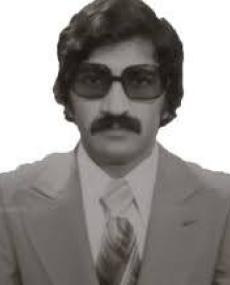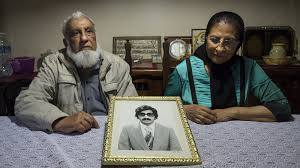
Dr Hoosen Mia Haffejee Image source
Political activist, dentist and political detainee.
Hoosen Mia Haffejee was born on 6 November 1950. Haffejee grew up in Pietermaritzburg and completed his primary schooling at St. Paul’s School and Marion School. He finished his secondary schooling at Woodlands where he matriculated in 1965. In 1966, he relocated to India to undertake his tertiary education. Haffejee enrolled for inter-science at the Bhavan's College in Bombay and thereafter went Nagpur to study Dentistry.
While in India, Haffejee participated in sporting activities representing his university in hockey. Perhaps more importantly, he was elected as the President of the Student Representative Council. Before returning to South Africa in 1976 he travelled to Pakistan, Afghanistan, Turkey and London. Securing employment after his return to proved to be difficult so he opted for an internship at Durban’s King George V Hospital.
His political affiliation is unclear but according to his older brother Yusuf Haffejee, he was politically active whilst he was in school and played an instrumental role in organising a number of student protests in Northdale. It seems Haffejee continued his political activism on his return from India and thus he was under police surveillance. On the morning of 3rd of August 1977 he was arrested by the Special Branch under the Terrorism Act on suspicion of being a trained saboteur and of plotting to overthrow the state. The police found him in possession of "subversive documents" advocating a revolution to establish a Socialist People's Republic. He was dead within twenty hours of his arrest.
The 26-year-old dentist was found hanging from his trousers from a grille door at Durban's Brighton Beach police station on 3 August 1977. An inquest into his death ensued. Captain James Taylor and Captain P.L. du Toit, the two Security Branch policemen, who made the arrest and interrogated Haffejee denied that they had tortured him during interrogation. The pathologist reported that the death was consistent with hanging. Yet, the report also stated that Haffejee sustained multiple injuries and that approximately sixty wounds covered his body - on his back, knees, arms and head. Dr W Cooper, Harry Pitman and Ismail Mahomed represented the Haffejee family. Ghota Motala helped Ismail Mahomed, future chief justice of South Africa, to prepare for the case. On the 15 March 1978, Mr Blunden, the inquest magistrate concluded that Haffejee died of suicide by hanging and that the injuries were unconnected and collateral to his death. Blunden claimed that:
"...submissions that other injuries found on the dentist's body were due to third degree methods, were pure speculation unsupported by evidence."
However, Dr. Haffejee’s death was symptomatic of the brutality employed by the security police during Apartheid. His tragic death devastated his family whilst at the same time raising their political consciousness. In a letter to the Natal Witness, penned in 1978, Haffajee’s mother wrote:
"I think the time has arrived for us, the blacks, to pray that God will open a door to protect our destiny from the cruel injustice of the South African Security Police. I hope our prayers are answered before it's too late for us all. As a grieving mother I cannot forget this terrible ordeal. My heart will always cry for my son."
For more than 40 years siblings Sarah and Ismail Haffejee have sought answers as to how their brother Hoosen had died.
Puzzled why police had initially arrested and tortured Hoosen, who had never confirmed having an allegiance to any political party, the family moved his body to Pietermaritzburg.
They found it odd that Hoosen had been found in a seated position, against the cell’s grille, with his pants wrapped tightly around his neck. His body was also found with numerous bruises and injuries.
“It is virtually impossible to hang from that position,” Ismail suggested.
The family commissioned Dr David Hobson Biggs to perform a post mortem. In his report, Biggs wrote: “I left the examination with many questions I could not answer.
“I observed that death had been caused by a tight constricting band around the neck. It appeared to be death by suffocation rather than a sudden arterial blockage.”
Biggs also found strange incisions and removal of pieces of skin from Haffejee’s body.
In the 1990s, Dr Haffejee’s death in detention came before the Truth and Reconciliation Commission. Evidence before the Commission suggested that Haffajee in all probability died as a result of torture. Former Security Branch policeman Mohun Deva Gopal gave evidence before the Commission and informed them that he was present whilst Haffejee was interrogated, assaulted and tortured. Gopal maintained that Captain Taylor initiated the assault. Haffejee was stripped naked, Captain Taylor then proceeded to slap and punch him when he refused to divulge any information. Captain Du Toit joined in later and the assault became more vicious lasting many hours.
Haffejee was steadfast in his silence. The perpetrators then prepared their stories that Du Toit instructed them to say that Haffejee had tried to escape and in so doing, had hit his body on the car. Captain James Taylor was subpoenaed to appear before the TRC but denied all allegations of assault and continued to maintain that, at the time of his death, Haffejee was in the custody of members of the uniformed branch. Taylor did not apply for amnesty in this regard.

justice